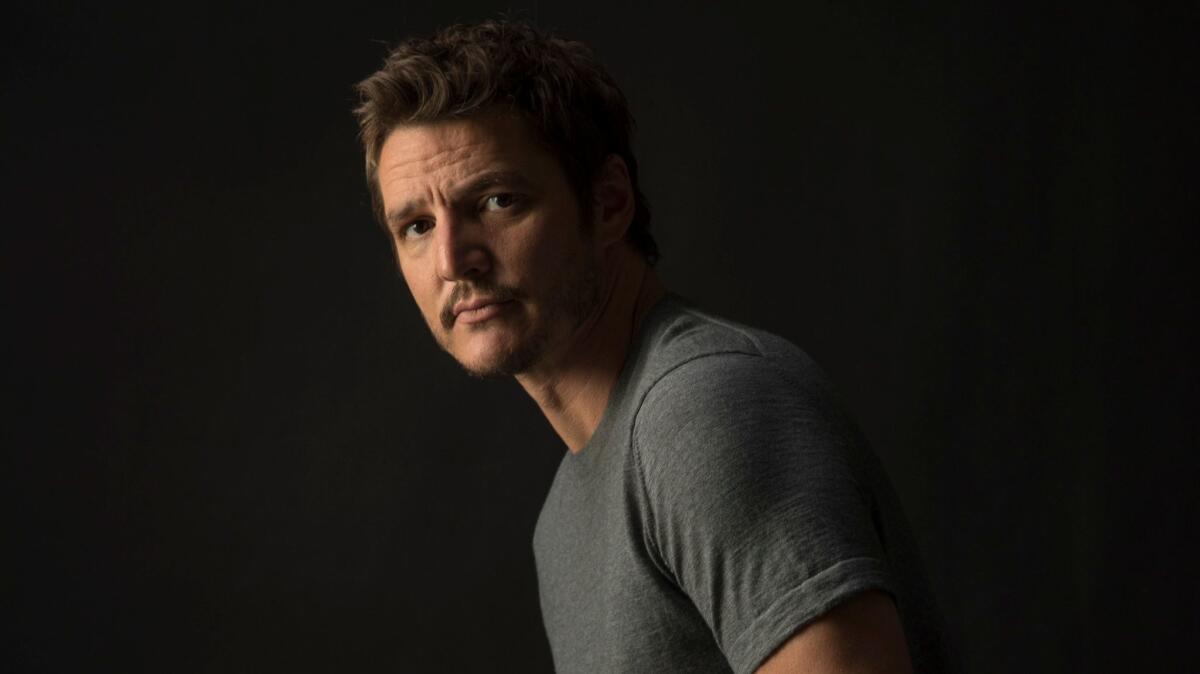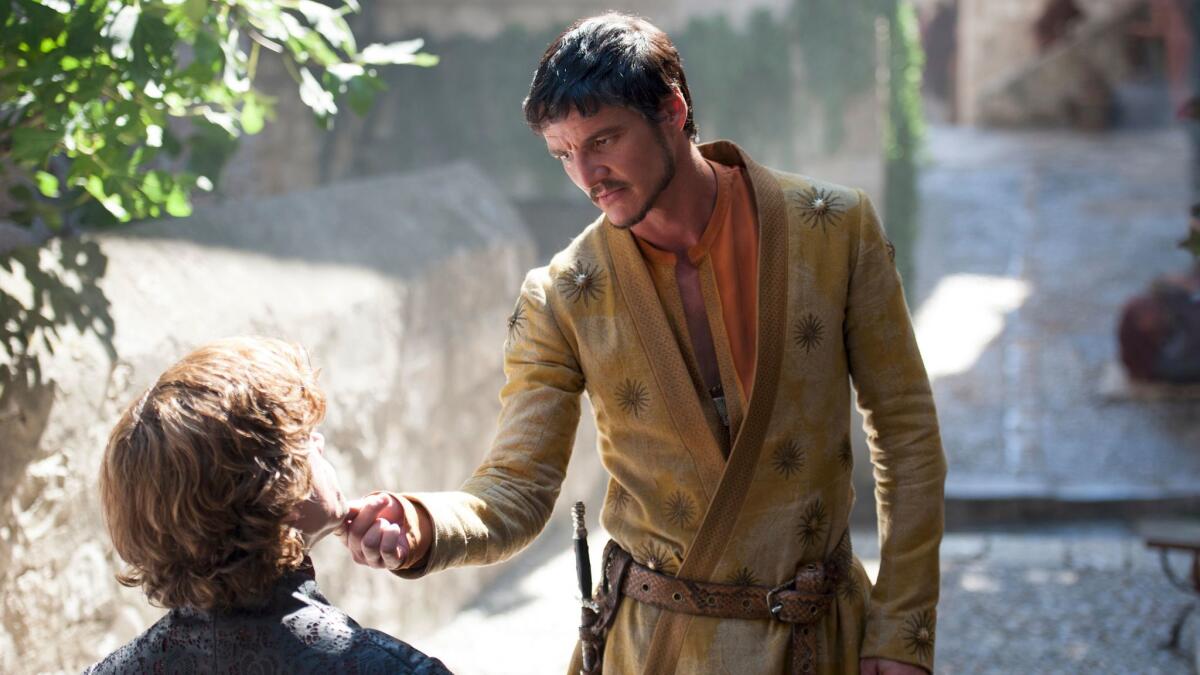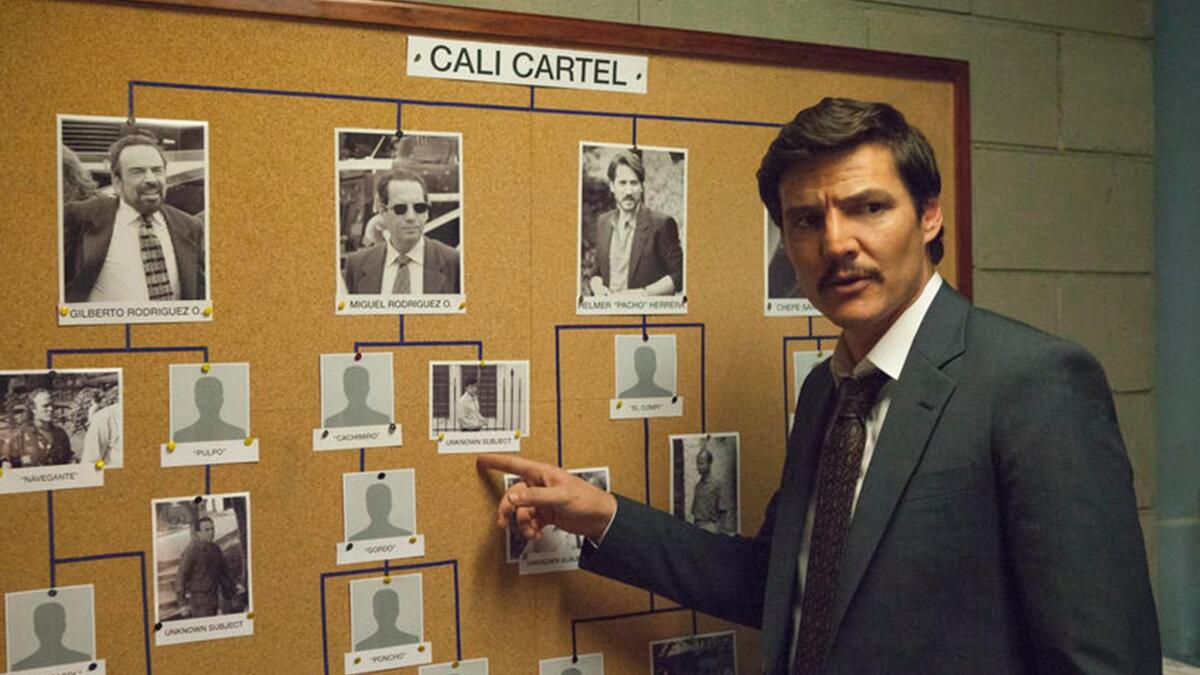A sex symbol on ‘Game of Thrones,’ Pedro Pascal is having a moment with ‘Narcos’ and ‘Kingsman’

When Pedro Pascal was a 26-year-old struggling actor, he moved into a cheap, one-bedroom apartment in Red Hook, Brooklyn. For much of the past 15 years, he strung together rent in the time-honored New York tradition of waiting tables and booking the occasional guest spot on “Law & Order.”
By his mid-30s, Pascal, who studied acting at New York University, was finally gaining steam with recurring parts in “The Good Wife” and “Brothers & Sisters.” But the real tipping point arrived when Pascal was cast as sexually voracious swordsman Oberyn Martell in Season 4 of “Game of Thrones,” a part he found out about when a young actor he was mentoring auditioned for it. Pascal put himself on tape, and sent it to his friend, Sarah Paulson, whose best friend Amanda Peet happens to be married to “Game of Thrones” showrunner David Benioff.
The part opened up a wave of opportunities for Pascal, who was born in Chile but raised in Texas and Orange County. The 42-year-old can currently be seen in an expanded role as DEA Agent Javier Peña in the Netflix drama “Narcos” and as Whiskey, a lasso-wielding secret agent in “Kingsman: The Golden Circle.” After careful consideration, Pascal finally gave up the dilapidated Red Hook apartment last year.
You spent your adolescent years in Orange County. What was that like?
I had a really hard time in Orange County. I was a nerd. I was watching foreign cinema when I was 13 and talking about how “Hope and Glory” should be a foreign film. We got HBO when I was 7. My parents would be in bed, “Children of the Corn” would be on at midnight and I'd watch it on mute. I was so obsessed with film and actors that I wasn't a very good student. I was always in trouble, but my father would always take us to the movies. I wanted to do that since I was a little kid.
See our complete guide to fall TV »
The story of how you got cast on “Game of Thrones” is pretty amazing. What made you so sure you were right for Oberyn?
He was dangerous. I'm not dangerous, but I have a sharp nose. I will probably be playing bad guys forever because of my face. There was something so sexy about the character. I loved stepping into that fantasy. One of the things that the creators told me was just by mention of his bisexuality there was a flamboyance the actors started to attribute to the character in their auditions. That never occurred to me. He seemed so male to me. The fact that he was bisexual had nothing to do with his exterior persona. I loved him as much as [showrunners David Benioff and D.B. Weiss] did, and they saw that. So it didn't matter that the casting director had never heard of me, HBO had no idea who the … I was. They knew what they wanted and they made it happen.

There was a group on Reddit for straight men who said they were “Gay For Oberyn.” What did you think of that?
It's so wonderful. I think it's all a spectrum, right? Straight men can have — do have — crushes on other men. It doesn't make them gay, it doesn't make them bi. I was super-flattered. The guys that picked on me in middle school in Corona del Mar probably have a crush on me now. Maybe they had a crush on me then and that's why they picked on me.
The violent association with Latino culture is an intense contrast to what it is to be Latino. It's not part of my experience at all.
— Pedro Pascal
Has working on “Narcos” changed your understanding of the war on drugs?
The specific Colombian history of these violent years breaks my heart a little bit. These are incredible people who feel that they can't really escape this association of being a narco-state. The experience of living and working in Colombia is in complete contrast to the story we're telling. I don't like the idea of advancing a sensationalist portrait of the drugs and the violence and the extravagance, though I know it fascinates and should be told as authentically as the budget can afford. But the violent association with Latino culture is an intense contrast to what it is to be Latino. It's not part of my experience at all.
Filming on location in Colombia, did you ever encounter resistance because of what the series is about?
There was never any kind of protest. What you would get is like a middle-aged woman taking her mother out for a walk in the evening as the breeze was beginning to set in and flirtatiously asking, “What are you guys making?” And you'd tell her it was a show called “Narcos.” And she'd go, “Tell a nicer story.”
Peña is essentially the lead character this season, and also took over as narrator. Is doing all that voice-over technically challenging?
It was hard. Peña's not a character who talks much. He doesn't give much away. So it was nice for him to just be like alright, here’s how it is. It was really really important for us [to get it right] because the voice-over is such a strong aesthetic to the series. It has to be conversational, not too intrusive, not to hand-holdy-y. I think we pulled it off.

As a Chilean American, how do you get along with Colombians?
Nobody likes Chile. We're the dorks of Latin America, isolated by the Andes and the Pacific, so we don't even know how to dance. But Colombians are the most polite. They won't talk [badly] about other countries. I remember Chile was playing the Colombian football team and we were shooting a scene on an airbase and I had to step out of a plane. There were a lot of crew members and extras around. I stepped out and went, "Viva, Chile!" And it was just death stares from everybody. That’s where they drew the line.
Your parents fled Chile after Augusto Pinochet took power. Tell me about that.
Then they were involved in the opposition. They helped somebody who'd been shot — a priest brought this person to my parents' house. So then they went looking for my father at the hospital. He was a resident at one of the main universities in Santiago. He snuck out the back and got my mom and the advice they were given was to go into hiding, because no one was going to help them. Connections didn't mean anything if you were on the list. They went into hiding for like six months and then they climbed the wall into the Venezuelan embassy and claimed asylum. We were given exile in Denmark and then ended up in San Antonio, Texas.
Did you ever sense that your family harbored any ill will towards the U.S., given its role in the coup?
They were very strong progressive leftists. If you brought something home from a Texas public school system that was not right, some bad talk about Russia or people of color, that was nipped in the bud really, really fast. My parents loved the U.S.
“Kingsman” looks like it was a lot of fun to make.
It was a very surreal blast. I had a complete magical love affair with London. I was in trailers next to
So what’s hardest to handle, Whiskey’s lasso, Oberyn’s sword or Peña’s gun?
The lasso was … impossible. You feel like a fool. I wanted it to be good enough for a couple of seconds of a frame, but you'd be surprised how long it takes to get that good.
What are you reading or watching these days?
I loved "Big Little Lies.” I'll get in so much trouble for saying this, but it was like real white-lady problems. The characters weren't oblivious to their privilege. The show tonally was aware of some of the absurdity. I thought it dealt very well with trauma, and the performances were just sensational. Reese Witherspoon was bonkers. Laura Dern could read me the phone book. And it was just so suspenseful. I was wonderfully uneasy the whole time I was watching it.
The complete guide to home viewing
Get Screen Gab for everything about the TV shows and streaming movies everyone’s talking about.
You may occasionally receive promotional content from the Los Angeles Times.



